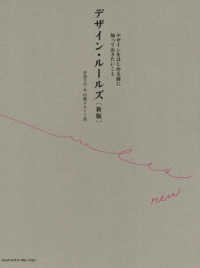- ホーム
- > 洋書
- > 英文書
- > Literary Criticism
Full Description
Queer Velocities: Time, Sex, and Biopower on the Early Modern Stage explores how seventeenth-century French theater represents queer desire. In this book, the first queer theoretical treatment of canonical French theater, Jennifer Eun-Jung Row proposes that these velocities, moments of unseemly haste or strategic delay, sparked new kinds of attachments, intimacies, and erotics. Rather than rely on fixed identities or analog categories, we might turn to these affectively saturated moments of temporal sensation to analyze queerness in the premodern world.
The twin innovations of precise, portable timepieces and the development of the theater as a state institution together ignited new types of embodiments, orderly and disorderly pleasures, and normative and wayward rhythms of life. Row leverages a painstakingly formalist and rhetorical analysis of tragedies by Jean Racine and Pierre Corneille to show how the staging of delay or haste can critically interrupt the normative temporalities of marriage, motherhood, mourning, or sovereignty—the quotidian rhythms and paradigms so necessary for the biopolitical management of life. Row's approach builds on the queer turn to temporality and Elizabeth Freeman's notion of the chronobiopolitical to wager that queerness can also be fostered by the sensations of disruptive speed and slowness. Ultimately Row suggests that the theater not only contributed to the glitter of Louis XIV's absolutist spectacle but also ignited new forms of knowing and feeling time, as well as new modes of loving, living, and being together.
Contents
Acknowledgements
Introduction: Queer Velocities
1. The Queer Disunity of Time, or the Affective Affordances of Le Cidy
2. Animate Ashes: The Time of Ruins and Remains in Andromaque
3. Polyeucte and the Speeds of Sects
4. Circling the Hymen: The Temporality of Dilation in BÉrÉnice
Conclusion: Stepping Out of Time
Notes
Bibliography
Index




![新TOEIC test実力診断模試 〈3〉 [CD+テキスト]](../images/goods/ar2/web/imgdata2/48761/4876151490.jpg)


